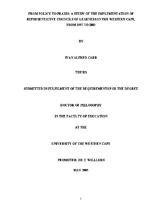| dc.description.abstract | This thesis traces the evolution of learner participation in school governance in South Africa, identifies international trends in school governance, particularly learner participation, and then analyses the progress made in South Africa in moving from policy to praxis in this regard. I have discussed the contextual forces that have influenced the production of the policy text on learner participation in the South African Schools Act. This is followed by an analysis of how the policy text has been interpreted and implemented at provincial level in the Western Cape, taking provincial legislation, regulations, circulars, and the capacity building programme that was implemented into consideration. I also look at how the whole process was experienced at institutional (school) level, and how the policy was interpreted and implemented. I also evaluate the phenomenon of learner participation in school governance in terms of promoting the principles of transformation, placing particular emphasis on the promotion of democratic practices in South Africa.In conclusion I contend that the present policy of learner participation in school governance does reflect the resolve of the National Government to promote the principle of participation by all stakeholders in matters affecting them. However, the study has shown that the implementation of the policy at provincial and institutional level has not been as effective as it might have been and has hampered the development of praxis in learner participation. This has hindered learners from making meaningful contributions towards the attainment of the goals as set out in the constitution. Furthermore, present rumblings of curtailing the powers of the school governing bodies because of limited progress in attaining the above goals seem to be a retrogressive step. I strongly contend that given the support, training and encouragement as set out in Article 19(2) of SASA, learner participation in school governance can make a positive contribution towards attaining the goals of transformation in our country, particularly of advancing democratic practices in our society. | en_US |

